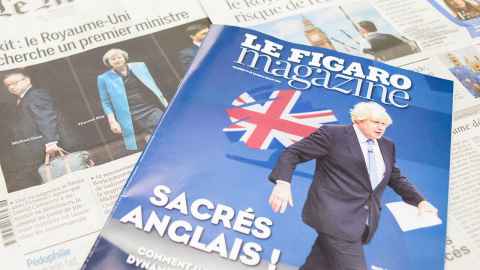The post-Boris Britain blues
12 July 2022
OPINION: Stephen Hoadley writes that Boris Johnson's successor will have a long list of debt, recession, inflation, capital and company flight, and skilled-labour shortages to manage.

To give Boris Johnson his due: he was Britain’s most engaging showman-politician. He ranks alongside Chamberlain, Churchill, and Thatcher as one of the most memorable PMs of the past century. The comparison ends when competence and achievement are invoked.
Johnson leaves behind a problematic legacy of soaring rhetoric, eccentric behaviour, dubious accomplishments, and notable missteps. His critics would say he leaves behind a mess that all but dooms his hapless successor to failure.
Judging by the sobriety of the candidates for Tory leadership, and the leaders of Labour and the Liberal Democrats, Britain will be spared another showman-politician…at least for a while.
Johnson began his public career as a newsman of the tabloid persuasion, and some would say he never transcended the compulsion to exaggerate. His reputation rested on mordant criticisms of Europe, particularly the European Union, more particularly the efforts of the UK government of the day to accommodate the tedious European collective decision-making processes and intrusive bureaucratic regulations.
To him, the EU was a constraint, not a force-multiplier, one that prevented Britain from realising its true potential. This tendentious view is fading considering the depressing economic consequences of Brexit.
It was as mayor of London, presiding over the Summer Olympics of 2012 and promoting ‘Cool Britannia’, that Johnson’s talents shined. Thereafter, as Theresa May’s foreign minister, he helped devise the slogan ‘Global Britain’ to project his country back to the centre of the world stage post-Brexit.
In 2022 he earned kudos at home and abroad as a staunch supporter of Ukraine in its defence against Russian aggression. His stands against Russia alongside G-7 leaders, the President of the United States, the Secretary-General of NATO, the Secretary-General of the United Nations, and the President of Ukraine (and the Prime Minister of New Zealand upon signing the free trade deal) were more than photo-ops; they produced real outcomes.
So, what has Johnson left behind for his successor to deal with? The list is not pretty: debt, recession, inflation, capital and company flight, and skilled-labour shortages as Europeans are sent back home.
But it was as the champion of Brexit, both in the referendum campaign of 2016 and in its implementation by the May government of which he was a leading member, that Johnson will be remembered.
On resignation day he himself cited Brexit as one of his achievements in public office, alongside his management of Covid and sending arms to Ukraine. However, a majority of Britons now cite Brexit as a problem, not a solution, and Johnson’s reputation must suffer correspondingly. Opinion on Johnson’s management of Covid is far from unanimous…and far from complimentary.
So, what has Johnson left behind for his successor to deal with? The list is not pretty: debt, recession, inflation, capital and company flight, and skilled-labour shortages as Europeans are sent back home. Add to this secessionist aspirations in Scotland and in Northern Ireland.
Abroad, Britain faces rancour with the EU over broken promises about customs borders, France over fishing grounds claims, China over predatory trade and cyber-spying, and Russia’s Putin over just about everything. And Britain’s policy of offshoring asylum seekers to Rwanda faces condemnation by human rights institutions and international law advocates.
Looking ahead, the ability of Britain to fulfill the expectations inflated by ’Global Britain’, entailing aspirations to provide security in Indo-Pacific theatres alongside the United States, Japan, and Australia, is in question due to constrictions of diplomatic and military budgets, personnel, and platforms.
AUKUS, the Australia-UK-US nuclear-powered submarine project, will take decades to become operational, leaving a credibility gap.
A key Johnson aspiration was the negotiation of new trade agreements to replace the trade framework provided by the EU. Agreements with New Zealand and Australia have been signed. But ratification and implementation will be delayed while the Tories appoint a new PM.
If that new PM is Liz Truss, who as trade secretary, then foreign secretary, negotiated the deals, there are grounds for optimism in Wellington and Canberra. Under a different PM, trade issues could sink in priority as other problems crowd in on a new governing team.
Likewise, Britain’s aspirations to join the Japan-led CPTPP, China-led RCEP, and US-led Indo-Pacific Framework for Prosperity may be hampered by capacity constraints, farmer resistance, and eroding diplomatic credibility.
A UK free trade deal with the US is a non-starter despite the oft-cited trans-Atlantic ‘Special Relationship’. This leaves Britain struggling to regain market access to Europe, its logical partner.
But there a cold shoulder is more likely than a warm handshake by those leaders on whom Johnson turned his back in 2020.
Britain may bounce back, led by a new, younger, more able PM backed by a competent political and advisory team who can negotiate with the EU with respect.
Johnson’s bold step-up to confront Russia, assist Ukraine, and call out China has boosted Britain’s reputation, and on this his successors may build if they are nimble and adaptable. Other governments are facing problems like Britain’s and may forgive London’s political wobbles.
It’s premature to write off the Tory leadership as hopeless as asserted by the opposition Labour Party leader Kier Starmer. It’s equally premature to predict that post-Brexit Britain led by the Tories will soar with the eagles, as Johnson claimed.
At this juncture all one can predict is that 10 Downing Street will be a dourer place post-Boris as its new occupant prepares to manage the next turbulent phase of Britain’s post-Brexit adaptation.
Stephen Hoadley is an associate professor of politics and international relations in the Faculty of Arts.
This article reflects the opinion of the author and is not necessarily that of the University of Auckland.
First published in Newsroom Britain's Post Boris Blues, 12 July 2022.
Media contact
Julianne Evans | Media adviser
M: 027 562 5868
E: julianne.evans@auckland.ac.nz